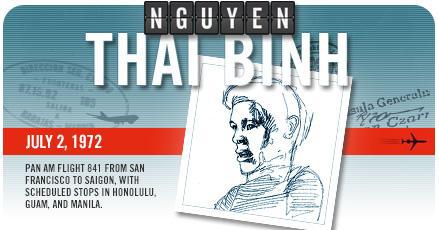In the late 1960s and early 1970s, the United States suffered through a skyjacking epidemic that has now been largely forgotten. In his new book, The Skies Belong to Us: Love and Terror in the Golden Age of Hijacking, Brendan I. Koerner tells the story of the chaotic age when jets were routinely commandeered by the desperate and disillusioned. In the run-up to his book’s publication on June 18, Koerner has been writing a daily series of skyjacker profiles. Slate is running the final dozen of these “Skyjacker of the Day” entries.
Name: Nguyen Thai Binh
Date: July 2, 1972
Flight Info: Pan Am Flight 841 from San Francisco to Saigon, with scheduled stops in Honolulu, Guam, and Manila.
The Story: In the summer of 1972, American airline pilots were livid over the inability of both their employers and the federal government to curtail the skyjacking epidemic. After a one-day work stoppage failed to alter public policy, many pilots felt that a more forceful statement of their frustration was in order. The hijacking of Pan Am Flight 841 provided an opportunity for one audacious Boeing 747 captain to make clear that he and his colleagues were sick of ceding control of their planes.
The hijacker, 24-year-old South Vietnamese native Nguyen Thai Binh, had graduated from the University of Washington on June 10 with a bachelor’s degree in fisheries management. He had once hoped to stay in the United States, but his visa had been revoked on June 7 due to his anti-war activism; he had been arrested for occupying the South Vietnamese consulate in New York. Seething over his expulsion as well as the carpet-bombing of North Vietnam, Binh had decided to hijack his flight home as an “act of revenge.”
Binh didn’t reveal his intentions to the Pan Am crew until they were over the South China Sea. He passed a stewardess a note: “You are going to fly me to Hanoi and this airplane will be destroyed when we get there.” When the flight’s captain, Eugene Vaughn, refused to comply, Binh wrote a second note, which he spattered with his own blood. “This indicates how serious I am about being taken to Hanoi,” it read.
Vaughn went to the main cabin to meet Binh, a meek-looking young man who stood less than 5 feet tall. Binh showed off a foil-wrapped package that he said contained a bomb. Vaughn correctly guessed that the Binh was bluffing. (The ominous package actually contained lemons.)
Vaughn knew that one of his passengers, a retired San Francisco police officer, had come on board with a .357 Magnum. He discreetly told the ex-cop to be prepared to end Binh’s life.
Under the pretext of making a refueling stop, Vaughn landed at Saigon’s Tan Son Nhut airport. Once the plane was at rest on the tarmac, Vaughn walked back to speak with the hijacker again. Binh was highly agitated, going on and on about how he would detonate his bomb unless the plane took off at once.
“I can’t understand you too well,” said Vaughn. “Let me come closer.”
Binh leaned his head forward as Vaughn knelt down. Before Binh could repeat his demand, the captain grabbed him by the throat and thrust him to the floor. “Kill this son of a bitch!” Vaughn yelled as he pinned down the struggling Binh.
The ex-cop came racing back with his weapon drawn and shot Binh five times at close range. Vaughn then heaved the hijacker’s 116-pound corpse out of the Boeing 747’s rear exit, so that all the world could see it splayed out on the tarmac. “I threw him through a door and he went about 15 feet out,” Vaughn would later recall. “I got a good football hold on him and he went just like a football.”
The Upshot: Many anti-war protestors in the U.S. openly mourned Binh, and a few of them broke into Vaughn’s home to leave a threatening note written in animal blood: “Pig Eugene Vaughn guilty of murder. To be punished later.” Yet the pilot was also widely lionized for his actions. He received a hero’s welcome at the Phoenix airport, for example, where bystanders applauded as he told the press: “A lot of time and effort has been spent on trying to prevent hijackings, but the only thing that will be effective is a mandatory death penalty, without any loopholes.”
